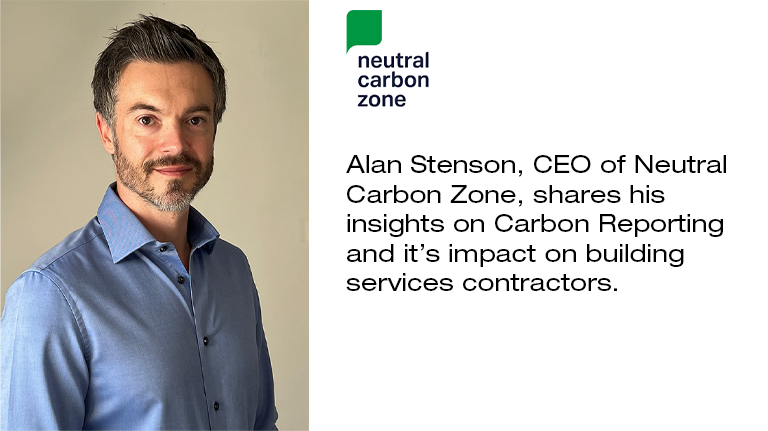Carbon reporting is becoming an increasingly important topic in the construction, building and facilities management industries, with many countries implementing laws and regulations aimed at reducing carbon emissions. Building services contractors are particularly impacted by these developments, as they play a critical role in designing, installing, managing and maintaining the very systems and processes that consume energy within buildings. In this article, we will explore the importance of carbon reporting for services contractors, and the steps that can be taken to mitigate the risks associated with these regulations.
What is Carbon Reporting?
Carbon reporting is the process of measuring, quantifying and disclosing the amount of carbon emissions generated by an organisation, product or service. This information is used to inform environmental policies, monitor progress towards carbon reduction targets, and enable stakeholders to make informed decisions about their carbon footprint. Carbon reporting is a critical part of carbon management and is essential for businesses to demonstrate their commitment to reducing their environmental impact.
The SECR regulations and the impact of Carbon Reporting regulations.
The importance of carbon reporting for building services contractors cannot be overstated. As the professionals responsible for designing and installing the systems that consume energy within buildings, building services contractors have a significant impact on carbon emissions. Heating, ventilation, and air conditioning (HVAC) systems, lighting, and other electrical systems all contribute to the carbon footprint of a building. Contractors must therefore be aware of the carbon footprint of their installations, both during the design phase and after the building is in operation.
Governments and regulatory bodies around the world are recognising the importance of reducing carbon emissions and are implementing regulations to encourage businesses to do so. In the UK, for example, the Climate Change Act of 2008 set a target for the country to reduce greenhouse gas emissions by at least 80% by 2050, compared to 1990 levels. The Act also created the Committee on Climate Change, which advises the UK government on climate change issues and regularly reviews the country’s progress towards meeting its emissions targets.
The UK has also introduced the Streamlined Energy and Carbon Reporting (SECR) framework, which requires large companies to report on their energy use and carbon emissions annually. Most service providers who work with these large companies will be impacted by the SECR regulations and must ensure that they are prepared to meet the reporting requirements, and/or assist their customers who in turn need insight into the emissions associated with the business they have with their suppliers.
Other countries have also implemented similar regulations. The European Union has introduced the Energy Performance of Buildings Directive, which requires member states to establish minimum energy performance requirements for new and existing buildings. The Directive also requires member states to implement regular inspections of heating and air conditioning systems in buildings to improve their energy efficiency.
In the United States, the Environmental Protection Agency (EPA) has introduced the Energy Star programme, which provides a rating system for buildings based on their energy performance. The programme requires building owners to report on their energy use and carbon emissions and encourages them to make improvements to reduce their carbon footprint.
Building services contractors who work in the residential sector are also impacted by carbon reporting regulations. In the UK, for example, all new homes must meet the government’s zero-carbon homes standard, which requires that all energy used in the home is generated from renewable sources. Building services contractors must be aware of these regulations and ensure that their installations meet the necessary standards.
What happens if you fail to comply with the regulations.
The risks of non-compliance with carbon reporting regulations are significant. Companies that fail to comply with these regulations may face fines, legal action, and reputational damage. Contractors who do not take carbon reporting seriously may find themselves excluded from lucrative contracts and losing business to competitors who have a better environmental record.
What to consider when complying with the regulations and how to manage the carbon emissions effectively.
To mitigate the risks associated with carbon reporting, building services contractors must take a proactive approach. They must ensure that they have the necessary systems and processes in place to measure, monitor, and report on their carbon emissions accurately. This may involve investing in new technology, such as energy-efficient systems and monitoring tools, and training staff to use these tools effectively.
They must also be proactive in engaging with stakeholders, including clients, suppliers, and regulatory bodies, to stay informed about the latest carbon reporting regulations and to ensure that their installations meet the necessary standards. This may involve attending industry conferences, joining industry associations, and participating in working groups focused on carbon management.
Contractors should also consider implementing an environmental management system (EMS) to help them manage their carbon emissions. An EMS is a framework that allows organisations to identify and manage their environmental impacts, including carbon emissions. The framework provides a structured approach to managing environmental performance, including setting environmental objectives, measuring performance, and implementing improvements.
Implementing an EMS can help contractors to meet their carbon reporting obligations, as well as to demonstrate their commitment to reducing their environmental impact. An EMS can also help companies to identify opportunities for improving energy efficiency and reducing carbon emissions, which can result in cost savings and other benefits.
Facilities Management services such as Contract Cleaning, Security and Maintenance, etc can all provide valuable insight into the environmental impact their services have on the sites where they are being provided. By doing so, service providers can fully manage the emissions associated with the work being commissioned by their client, which offers significant value as this is an entire potion of emissions that their client is ultimately responsible for but can’t manage without them.
Carbon reporting is rapidly becoming one of the most important issues facing building services contractors. Governments and regulatory bodies around the world are implementing regulations aimed at reducing carbon emissions, and contractors must be prepared to meet these reporting requirements. They must ensure that they have the necessary systems and processes in place to measure, monitor, and report on their carbon emissions accurately. They must also engage with stakeholders and consider implementing an environmental management system or carbon management programme to help them manage their carbon emissions effectively. Service providers who take a proactive approach to carbon reporting can mitigate the risks associated with non-compliance and position themselves as leaders in their industry’s transition to a low-carbon future.
To find out more about how you can better position your business as a partner of choice visit Neutral Carbon Zone online.
Alan Stenson, CEO
Neutral Carbon Zone
About Alan Stenson
Alan Stenson is the CEO of Neutral Carbon Zone. Since 2006, Alan has been pioneering innovative sustainability solutions for companies that are committed to reducing their environmental impact. With a significant focus on establishing market leading programmes to the FM industry, and a desire to enable clients to truly integrate carbon management into their services, Alan has been able to work with many of the industry’s most progressive organisations.
Creating the World’s first Carbon Neutral Cleaning system, establishing a UK reforestation CSR programme and producing a suite of Carbon Neutral digital tools are just some of the market leading innovations that Alan is most proud of.
Latest Articles

Underinsurance Claims Scenario
You wouldn’t want to hear that your insurance won’t be enough to cover a claim. Businesses across the UK that are already struggling, thanks to surging inflation and its knock-on effect on

